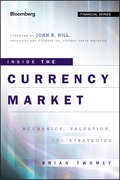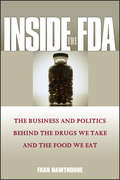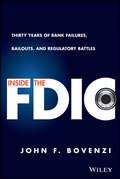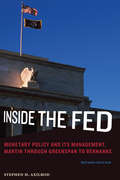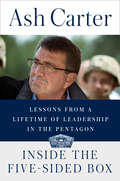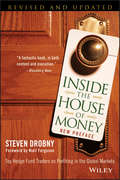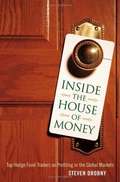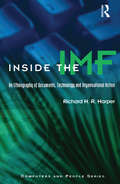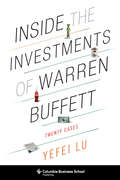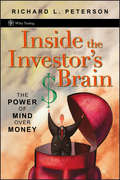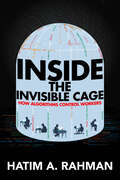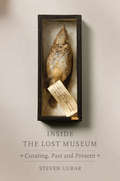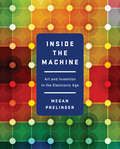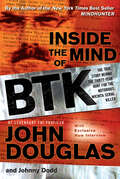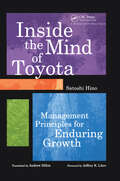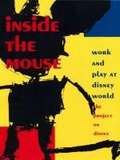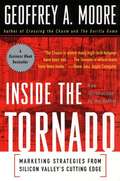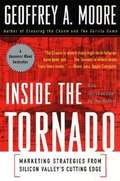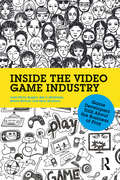- Table View
- List View
Inside the Crystal Ball
by Maury HarrisA practical guide to understanding economic forecastsIn Inside the Crystal Ball: How to Make and Use Forecasts, UBS Chief U.S. Economist Maury Harris helps readers improve their own forecasting abilities by examining the elements and processes that characterize successful and failed forecasts. The book:Provides insights from Maury Harris, named among Bloomberg's 50 Most Influential People in Global Finance.Demonstrates "best practices" in the assembly and evaluation of forecasts. Harris walks readers through the real-life steps he and other successful forecasters take in preparing their projections. These valuable procedures can help forecast users evaluate forecasts and forecasters as inputs for making their own specific business and investment decisions.Emphasizes the critical role of judgment in improving projections derived from purely statistical methodologies. Harris explores the prerequisites for sound forecasting judgment--a good sense of history and an understanding of contemporary theoretical frameworks--in readable and illuminating detail.Addresses everyday forecasting issues, including the credibility of government statistics and analyses, fickle consumers, and volatile business spirits. Harris also offers procedural guidelines for special circumstances, such as natural disasters, terrorist threats, gyrating oil and stock prices, and international economic crises.Evaluates major contemporary forecasting issues--including the now commonplace hypothesis of sustained economic sluggishness, possible inflation outcomes in an environment of falling unemployment, and projecting interest rates when central banks implement unprecedented low interest rate and quantitative easing (QE) policies.Brings to life Harris's own experiences and those of other leading economists in his almost four-decade career as a professional economist and forecaster. Dr. Harris presents his personal recipes for long-term credibility and commercial success to anyone offering advice about the future.
Inside the Currency Market
by Brian Twomey John R. HillA complete resource to trading today's currency marketCurrency movements are impacted by a variety of factors, including interest rates, trade balances, inflation levels, monetary and fiscal policies, and the political climate. Traders use both fundamental data and a variety of technical tools to trade within this market. Inside the Currency Market describes both the underlying dynamics that drive this market and the strategies that can help you capture consistent profits in it. Page by page, this reliable guide skillfully discusses the structure of the market, its roles in the global economy, the forces that drive currency values, trading strategies, and tactics. It also offers a detailed understanding of how global financial flows, derivatives, and other markets such as oil and gold impact currencies. Along the way, author and professor Brian Twomey provides information on gathering and analyzing global financial data so that traders can gain a "big-picture" perspective when attempting to identify trades.Explains virtually every element of the market and can function as a desk reference that puts everyday events into context for tradersFundamentally driven trades based on interest rate differentials and trade imbalances are discussed, as well as technical trades involving chart patterns, trends, and trading rangesEach chapter contains questions and answers to help readers master the materialThe currency market continues to generate interest and attract new retail traders due to the many opportunities available within it. This book will show you how to successfully operate within this arena by making the most informed trading decisions possible.
Inside the Energiewende: Twists and Turns on Germany’s Soft Energy Path (Lecture Notes in Energy #75)
by Christine SturmThis book tells the story of one nation’s sustained efforts to steer its economy toward low carbon technologies and to define national and global pathways for mitigating climate change. Drawing on a long career in Germany’s energy sector, and on subsequent academic research, the book reveals the weaknesses of and critical trade-offs in Germany’s bold energy transition plan − the Energiewende − and explores their causes. Its goal is to provide insights to help policymakers and energy managers keep some of the problems that have plagued the Energiewende at bay, and to instead explore avenues that are more likely to succeed. While such insights cannot solve the problem of socio-technical change overnight, they do reveal alternative transition pathways that keep climate goals clearly in sight, even if they are pursued with a bit less exuberance and a bit more humility. The book is addressed to academic, professional, and political readers alike.
Inside the FDA
by Fran HawthorneThe forces that shape America's most powerful consumer agency Because of the importance of what it regulates, the FDA comes under tremendous political, industry, and consumer pressure. But the pressure goes far beyond the ordinary lobbying of Washington trade groups. Its mandate-one quarter of the national economy-brings the FDA into the middle of some of the most important and contentious issues of modern society. From "designer" babies and abortion to the price of prescription drugs and the role of government itself, Inside the FDA takes readers on an intriguing journey into the world of today's most powerful consumer agency. In a time when companies continue to accuse the FDA of nitpicking and needlessly delaying needed new drugs, and consumers are convinced that the agency bends to industry pressure by rushing unsafe drugs to market, Inside the FDA digs deep to reveal the truth. Through scores of interviews and real-world stories, Hawthorne also shows how and why the agency makes some of its most controversial decisions as well as how its recent reaction to certain issues-including the revolutionary cancer drug Erbitux, stem cell research, and bioengineering of food-may jeopardize its ability to keep up with future scientific developments. Inside the FDA takes a closer look at the practices, people, and politics of this crucial watchdog in light of the competing pressures and trends of modern society, revealing what the FDA is supposed to do, what it actually does-and fails to do-who it influences, and how it could better fulfill its mandate. The decisions that the FDA makes are literally life and death. Inside the FDA provides a sophisticated account of how this vitally important agency struggles to balance bureaucracy and politics with its overriding mission to promote the country's health. Fran Hawthorne (New York, NY) is a senior contributing editor of Institutional Investor and has connections deep within the business and finance communities. Hawthorne has been covering healthcare and business for more than twenty years for such publications as Fortune, BusinessWeek, and Crain's New York Business. She is the author of The Merck Druggernaut (cloth: 0-471-22878-8; paper: 0-471-67906-2).
Inside the FDIC
by John F. BovenziWitness how the FDIC manages your money during financial crisesInside the FDIC tells the real stories behind bank failures and financial crises to provide a direct account of the Federal Deposit Insurance Corporation and other bank regulators. Author John Bovenzi served in senior level positions within the FDIC for over twenty years, including a decade as the Deputy to the Chairman and Chief Operating Officer. This book describes what he witnessed as the person in charge of day-to-day operations, as a nearly invisible agency grew to become a major, highly independent force impacting US financial markets.Readers will learn how the FDIC and other bank regulators use the power of the federal government, spend other people's money, and approach decision-making.This book takes readers inside the FDIC to showcase:The FDIC's emergence as a major market influenceHow ten FDIC chairmen helped shape the US financial regulatory systemInternal conflicts between the FDIC and other bank regulatory agenciesPressures and challenges presented by financial crisesSince the early 1980s, over 3,400 banks have failed. These failures weren't steady, regular, and easily predictable events; periods of tranquility were followed by turmoil, booms led to busts, and peaceful complacency often turned to sudden devastation. Inside the FDIC chronicles it all, from the perspective of a first hand witness inside the agency responsible for calming the storm.
Inside the Fed, revised edition: Monetary Policy and Its Management, Martin through Greenspan to Bernanke
by Stephen H. AxilrodAn insider's account of the workings of the Federal Reserve, thoroughly updated to encompass the Fed's action (and inaction) during the recent financial meltdown.Stephen Axilrod is the ultimate Federal Reserve insider. He worked at the Fed's Board of Governors for more than thirty years and after that in private markets and as a consultant on monetary policy. With Inside the Fed, he offers his unique perspective on the inner workings of the Federal Reserve System during the last fifty years. This new, post-financial meltdown edition offers his assessment of the Fed's action (and inaction) during the crisis and expanded coverage of the Fed in the Bernanke era.Great leadership in monetary policy, Axilrod says, is determined not by pure economic sophistication but by the ability to push through political and social barriers to achieve a paradigm shift in policy—and by the courage and bureaucratic moxie to pull it off.
Inside the Fed: Monetary Policy and Its Management, Martin Through Greenspan to Bernanke
by Stephen H. AxilrodStephen Axilrod is the ultimate Federal Reserve insider. He worked at the Fed's Board of Governors for over thirty years and after that in private markets and as a consultant on monetary policy. With Inside the Fed,he offers his unique perspective on the inner workings of the Federal Reserve System during the last fifty years--writing about personalities as much as policy--based on his knowledge and observations of every Fed chairman since 1951. Axilrod's discussion focuses on how the personalities of the various chairmen affected their capacity for leadership. He describes, for example, Arthur Burns's response to political pressure from the Nixon White House and Paul Volcker's radical shift to an anti-inflationary policy at the end of the 1970s--a transition in which Axilrod himself played a crucial role. As for the Greenspan years, Axilrod points to the unintended effects of the Fed's newfound "garrulousness" (the plethora of announcements and hints about policy intentions)--one of which was the Fed's loss of credibility in the aftermath of the chairman's 1996 comment about "irrational exuberance." And Axilrod incisively outlines the problems--including the subprime mess--inherited from Greenspan by the current chairman, Ben Bernanke. Great leadership in monetary policy, Axilrod says, is determined not by pure economic sophistication but by the ability to push through political and social barriers to achieve a paradigm shift in policy--and by the courage and bureaucratic moxie to pull it off.
Inside the Five-Sided Box: Lessons from a Lifetime of Leadership in the Pentagon
by Ash CarterThe twenty-fifth Secretary of Defense takes readers behind the scenes to reveal the inner workings of the Pentagon, its vital mission, and what it takes to lead it. The Pentagon is the headquarters of the single largest institution in America: the Department of Defense. The D.O.D. employs millions of Americans. It owns and operates more real estate, and spends more money, than any other entity. It manages the world’s largest and most complex information network and performs more R&D than Apple, Google, and Microsoft combined. Most important, the policies it carries out, in war and peace, impact the security and freedom of billions of people around the globe. Yet to most Americans, the dealings of the D.O.D. are a mystery, and the Pentagon nothing more than an opaque five-sided box that they regard with a mixture of awe and suspicion. In this new book, former Secretary of Defense Ash Carter demystifies the Pentagon and sheds light on all that happens inside one of the nation’s most iconic, and most closely guarded, buildings. Drawn from Carter’s thirty-six years of leadership experience in the D.O.D., this is the essential book for understanding the challenge of defending America in a dangerous world—and imparting a trove of incisive lessons that can guide leaders in any complex organization. In these times of great disruption and danger, the need for Ash Carter’s authoritative and pragmatic account is more urgent than ever.
Inside the House of Money
by Niall Ferguson Steven DrobnyNew commentary and updates to enlightening interviews with today's top global macro hedge fund managersThis updated paperback edition of Inside the House of Money lifts the veil on the typically opaque world of hedge funds offering a rare glimpse at how today's highest paid money managers approach their craft. Now with new commentary, author, Steve Drobny takes you even further into the hedge fund industry. He demystifies how these star traders make billions for their well-heeled investors, revealing their theories, strategies and approaches to markets.Whereas some still maintain that rationality permeates financial markets, Drobny captures a different dimension, showing how the unquantifiable human forces of emotion and intuition are also at play. Along the way, readers get an inside look at firsthand trading experiences through some of the major world financial crises of the last few decades.Discusses how no market or instrument is out of bounds for these elite global macro hedge fund managersOffers unique and illuminating insight into an inaccessible and sometimes downright secretive worldWritten by respected industry expert Steven DrobnyHighly accessible and filled with in-depth expert opinion, this updated paperback edition of Inside the House of Money is a must-read for financial professionals and anyone else interested in understanding how greed, fear, and the human forces of emotion drive world markets.
Inside the House of Money: Top Hedge Fund Traders on Profiting in the Global Markets
by Steve DrobnyInside the House of Money lifts the veil on the typically opaque world of hedge funds, offering a rare glimpse at how today's highest paid money managers approach their craft. Author Steven Drobny demystifies how these star traders make billions for well-heeled investors, revealing their theories, strategies and approaches to markets. Drobny, cofounder of Drobny Global Advisors, an international macroeconomic research and advisory firm, has tapped into his network and beyond in order assemble this collection of thirteen interviews with the industry's best minds. Along the way, you'll get an inside look at firsthand trading experiences through some of the major world financial crises of the last few decades. Whether Russian bonds, Pakistani stocks, Southeast Asian currencies or stakes in African brewing companies, no market or instrument is out of bounds for these elite global macro hedge fund managers. Highly accessible and filled with in-depth expert opinion, Inside the House of Money is a must-read for financial professionals and anyone else interested in understanding the complexities at stake in world financial markets. "The ruminations of supposedly hush-hush hedge fund operators are richly illuminating." --New York Times
Inside the IMF
by Richard HarperIn this book, Richard Harper uses the International Monetary Fund as a case study to show how thinking differently about IT systems can dramatically improve the manageability and accessibility of documents in organisations. The systems he considers uses search and retrieval applications, the use of hypertext documents and shared database applications like Lotus Notes.
Inside the Investments of Warren Buffett: Twenty Cases
by Yefei LuSince the 1950s, Warren Buffett and his partners have backed some of the twentieth century's most profitable, trend-setting companies, but how did they know they were making the right investments? Did Buffett take the lead on every decision, or was the key to act cooperatively? What did Buffet and his partners look for in an up-and-coming company, and is it possible for others to copy their approach?A gift to Buffett followers who have long sought a pattern to the investor's success, Inside the Investments of Warren Buffett presents the most detailed analysis to date of Buffet's long-term investment portfolio. Yefei Lu, a private investor, starts with Buffett's interest in the Sanborn Map Company in 1960 and tracks nineteen more of his major investments in companies such as See's Candies, the Washington Post, GEICO, Coca-Cola, US Air, Wells Fargo, and IBM. With rare access to partnership letters, company documents, annual reports, third-party references, and other original sources, Lu pinpoints what is unique about Buffett's timing, instinct, use of outside knowledge, and postinvestment actions, and he identifies what could work for all investors with companies big and small, global and domestic. His substantial chronology accounts for broader world events and fluctuations in the U.S. stock market, suggesting Buffett's most important trait may be his open and alert worldview.
Inside the Investments of Warren Buffett: Twenty Cases (Columbia Business School Publishing Ser.)
by Yefei LuSince the 1950s, Warren Buffett and his partners have backed some of the twentieth century's most profitable, trendsetting companies. But how did they know they were making the right investments? What did Buffet and his partners look for in an up-and-coming company, and how can others replicate their approach?A gift to Buffett followers who have long sought a pattern to the investor's success, Inside the Investments of Warren Buffett presents the most detailed analysis to date of Buffet's long-term investment portfolio. Yefei Lu, an experienced investor, starts with Buffett's interest in the Sanborn Map Company in 1958 and tracks nineteen more of his major investments in companies like See's Candies, the Washington Post, GEICO, Coca-Cola, US Air, Wells Fargo, and IBM. Accessing partnership letters, company documents, annual reports, third-party references, and other original sources, Lu pinpoints what is unique about Buffett's timing, instinct, use of outside knowledge, and postinvestment actions, and he identifies what could work well for all investors in companies big and small, domestic and global. His substantial chronology accounts for broader world events and fluctuations in the U.S. stock market, suggesting Buffett's most important trait may be the breadth of his expertise.
Inside the Investor's Brain
by Peterson Richard L.Unique insights into how the mind of an investor operates and how developing emotional awareness leads to long-term success Inside the Investor's Brain provides readers with specific techniques for understanding their financial psychology, so that they can improve their own performance and learn how to outsmart other investors. Chapter by chapter, author Richard Peterson addresses various mental traps and how they play a role in investing. Through examples, such as a gambling experiment with playing cards, the author shows readers how being aware of the subconscious can separate the smart investors from the average ones. This book also contains descriptions of the work of neuroscientists, financial practitioners, and psychologists, offering an expert's view into the mind of the market. Innovative and accessible, Inside the Investor's Brain gives investors the tools they need to better understand how emotions and mental biases affect the way they manage money and react to market moves.
Inside the Invisible Cage: How Algorithms Control Workers
by Hatim RahmanIn a world increasingly run by algorithms and artificial intelligence, Hatim Rahman traces how organizations are using algorithms to control workers in an "invisible cage." Inside the Invisible Cage uses unique longitudinal data to investigate how digital labor platforms use algorithms to dictate the actions of high-skilled workers by determining accepted behaviors, work opportunities, and even success. As Hatim Rahman explains, employers can use algorithms to shift rules and guidelines without notice, explanation, or recourse for workers. The invisible cage signals a profound shift in the way markets and organizations categorize and ultimately control people. Unlike previous forms of labor control, the invisible cage is ubiquitous, yet it is also opaque and shifting, which makes breaking free from it difficult for workers. This book traces how the invisible cage was developed over time and the implications it has for the spread of new technology, such as generative artificial intelligence. Inside the Invisible Cage also provides organizations, workers, and policymakers with insights on how to ensure the future of work has truly equitable, mutually beneficial outcomes.
Inside the Lost Museum: Curating, Past and Present
by Steven LubarMuseum lovers know that energy and mystery run through every exhibition. Steven Lubar explains work behind the scenes—collecting, preserving, displaying, and using art and artifacts in teaching, research, and community-building—through historical and contemporary examples, especially the lost but reimagined Jenks Museum at Brown University.
Inside the Machine: Art and Invention in the Electronic Age
by Megan PrelingerA visual history of the electronic age captures the collision of technology and art--and our collective visions of the future. A hidden history of the twentieth century's brilliant innovations--as seen through art and images of electronics that fed the dreams of millions. A rich historical account of electronic technology in the twentieth century, Inside the Machine journeys from the very origins of electronics, vacuum tubes, through the invention of cathode-ray tubes and transistors to the bold frontier of digital computing in the 1960s. But, as cultural historian Megan Prelinger explores here, the history of electronics in the twentieth century is not only a history of scientific discoveries carried out in laboratories across America. It is also a story shaped by a generation of artists, designers, and creative thinkers who gave imaginative form to the most elusive matter of all: electrons and their revolutionary powers. As inventors learned to channel the flow of electrons, starting revolutions in automation, bionics, and cybernetics, generations of commercial artists moved through the traditions of Futurism, Bauhaus, modernism, and conceptual art, finding ways to link art and technology as never before. A visual tour of this dynamic era, Inside the Machine traces advances and practical revolutions in automation, bionics, computer language, and even cybernetics. Nestled alongside are surprising glimpses into the inner workings of corporations that shaped the modern world: AT&T, General Electric, Lockheed Martin. While electronics may have indelibly changed our age, Inside the Machine reveals a little-known explosion of creativity in the history of electronics and the minds behind it.
Inside the Mind of BTK: The True Story Behind the Thirty-Year Hunt for the Notorious Wichita Serial Killer
by John Douglas Johnny DoddThe FBI profiler & co-author of the #1 New York Times–bestseller Mindhunter recounts his role in catching one of America&’s most notorious serial killers.Inside the Mind of BTK tells the incredible true story of how FBI profiler John Douglas tracked and participated in the hunt for one of the most notorious serial killers in US history. For thirty-one years a man who called himself BTK (Bind, Torture, Kill) terrorized the city of Wichita, Kansas, sexually assaulting and strangling a series of victims, taunting the police with cryptic communications, and bragging about his vicious crimes to local newspapers and television stations. After disappearing for nine years, he suddenly reappeared, complaining that no one was paying enough attention to him and claiming that he had committed other crimes for which he had not been given credit. When he was finally captured, BTK was revealed to be Dennis Rader, a sixty-one-year-old churchgoing, married man with two children. As a leading serial killer profiler for the FBI, John Douglas was first called to consult about the case in 1980 and remained involved with the story and all of its principal players up to the arrest and prosecution. After Rader was arrested, Douglas was granted both an exclusive interview with the killer after his sentencing, as well as access to friends, family, and police. In this page-turning book, Douglas reveals both new information and insight into why Rader did what he did, why he stopped for a mysterious nine-year period, and his current psychological state in custody. Praise for Inside the Mind of BTK &“Legendary profiler and bestselling author Douglas (Mindhunter), who pioneered the FBI&’s systematic study of serial killers, offers his insights into one of this country&’s most chilling killers—Dennis Rader, a seemingly innocuous family man and municipal employee, whose brutal murders terrorized Wichita, Kans., for three decades. . . . While the stomach-turning story of BTK's crimes has been told by others, Douglas's unique professional experience and his exclusive personal access to Rader offers a different perspective, even as the answer to the question of how such a monster comes to be remains elusive.&” —Publishers Weekly&“Riveting! Douglas and Dodd have focused a laser sight on one of the most fascinating and disturbing serial killers of our time. Their in-depth analysis of BTK&’s early childhood, his seemingly &“normal&” everyday life, and his shockingly well-hidden &“other&” life deftly explores the nature of evil and how we can better protect ourselves from such cunning predators.&” ―Lisa Gardner, New York Times–bestselling suspense author of Hide
Inside the Mind of Toyota: Management Principles for Enduring Growth
by Satoshi HinoWinner of a Shingo Research and Professional Publication AwardToyota's sustained growth attracts the attention of economists and industrialists around the world eager to learn the secrets of Toyota's lasting success.In Inside the Mind of Toyota: Management Principles for Enduring Growth, Satoshi Hino examines the source of Toyota's strength: the fundamental thinking and management structures that lie beneath the creation of its famed Toyota Production System. From the perspective of a professional with 30 years experience in the auto industry, Hino presents a fresh and detailed analysis of Toyota's essential management system, from its very beginnings into the 21st century.The ultimate goal is not simply to mimic Toyota's formula, but to learn from it and, in doing so, surpass it.From the Translator's Foreword:Unlike most Toyota watchers, Hino urges us to set our sights not on replicating Toyota's success, but on surpassing it. This point is crucial, because it moves our attention away from slavish imitation of what is visible on the surface and challenges us to tap into deeper and more powerful mechanisms of excellence. This is not a cookbook and it is not 'Toyota Lite.' It deserves serious study, application and experimentation. Learn how Toyota thinks, Hino is telling us. Learn Toyota's strengths, make them your own and then exceed them.—Andrew Dillon,September
Inside the Mouse: Work and Play at Disney World
by The Project on DisneyThis entertaining and playful book views Disney World as much more than the site of an ideal family vacation. Blending personal meditations, interviews, photographs, and cultural analysis, Inside the Mouse looks at Disney World's architecture and design, its consumer practices, and its use of Disney characters and themes. This book takes the reader on an alternative ride through "the happiest place on earth" while asking "What makes this forty-three-square-mile theme park the quintessential embodiment of American leisure?" Turning away from the programmed entertainment that Disney presents, the authors take a peek behind the scenes of everyday experience at Disney World. In their consideration of the park as both private corporate enterprise and public urban environment, the authors focus on questions concerning the production and consumption of leisure. Featuring over fifty photographs and interviews with workers that strip "cast members" of their cartoon costumes, this captivating work illustrates the high-pressure dynamics of the typical family vacation as well as a tour of Disney World that looks beyond the controlled facade of themed attractions. As projects like EuroDisney and the proposed Disney America test the strength of the Disney cultural monolith, Inside the Mouse provides a timely assessment of the serious business of supplying pleasure in contemporary U.S. culture. Written for the general reader interested in the many worlds of Disney, this engrossing volume will also find fans among students and scholars of cultural studies.
Inside the Patent Factory
by Donal O'ConnellThe book is a coaching guide for anyone interested in intellectual property and those wanting to embark on or develop patent creation. It draws on the authors' extensive experience and insights from change projects, management and leadership at Nokia.The book guides the reader through each stage of setting up a successful unit, inviting active involvement by asking vital questions about their needs and aims. Focusing on key issues and themes involved, it provides examples, diagrams and models to illustrate how they can be out in to practice. Critical chapters include the core activities of patent creation, possible organisational models, costs, quality and the comparison of external and internal allocation of tasks. Discussion concentrates on how to such define roles and responsibilities and the management techniques of external resources.The book encourages the reader to challenge their current organisational structure and strategy by introducing various methods and tactics that can be deployed when considering patent creation, then offering advice into the pros and cons of techniques and how such methods can be assessed. The book highlights how knowledge and innovation can be utilised and protected, which due to the increased importance of intellectual property rights, especially the use of patents, is essential for every business.
Inside the Tornado
by Geoffrey A. MooreIn this, the second of Geoff Moore's classic three-part marketing series, Moore provides highly useful guidelines for moving products beyond early adopters and into the lucrative mainstream market. Updated for the HarperBusiness Essentials series with a new author's note. Once a product "crosses the chasm" it is faced with the "tornado," a make or break time period where mainstream customers determine whether the product takes off or falls flat. In Inside the Tornado, Moore details various marketing strategies that will teach marketers how reach these customers and how to take advantage of living inside the tornado in order to reap the benefits of mainstream adoption.
Inside the Tornado: Strategies for Developing, Leveraging, and Surviving Hypergrowth Markets
by Geoffrey A. MooreGeoffrey A. Moore delves into the high-stakes world of hypergrowth markets. Here, Moore examines these markets and their implications for business strategies and, in turn, provides effective guidelines for winning market share and building margin share in mainstream markets. Once a product reaches the mainstream market, it faces three often vexing questions: What is the best way to develop a stronger market for the product's growth? What is the most effective way to capitalize on and sustain growth? And when this market inevitably subsides, how can businesses survive the change? Moore deftly answers these questions and provides businesses with the knowledge and tools they need in this fast-paced lucrative market.
Inside the Tornado: Strategies for Developing, Leveraging, and Surviving Hypergrowth Markets
by Geoffrey A. MooreIn this, the second of Geoff Moore's classic three-part marketing series, Moore provides highly useful guidelines for moving products beyond early adopters and into the lucrative mainstream market. Updated for the HarperBusiness Essentials series with a new author's note.Once a product "crosses the chasm" it is faced with the "tornado," a make or break time period where mainstream customers determine whether the product takes off or falls flat. In Inside the Tornado, Moore details various marketing strategies that will teach marketers how reach these customers and how to take advantage of living inside the tornado in order to reap the benefits of mainstream adoption.
Inside the Video Game Industry: Game Developers Talk About the Business of Play
by Judd Ruggill Ken McAllister Randy Nichols Ryan KaufmanInside the Video Game Industry offers a provocative look into one of today's most dynamic and creative businesses. Through in-depth structured interviews, industry professionals discuss their roles, providing invaluable insight into game programming, art, animation, design, production, quality assurance, audio and business professions. From hiring and firing conventions, attitudes about gender disparity, goals for work-life balance, and a span of legal, psychological, and communal intellectual property protection mechanisms, the book's combination of accessible industry talk and incisive thematic overviews is ideal for anyone interested in games as a global industry, a site of cultural study, or a prospective career path. Designed for researchers, educators, and students, this book provides a critical perspective on an often opaque business and its highly mobile workforce. Additional teaching materials, including activities and study questions, can be found at https://www.routledge.com/9780415828284.

